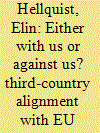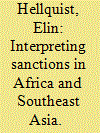| Srl | Item |
| 1 |
ID:
151315


|
|
|
|
|
| Summary/Abstract |
Since the mid-1990s, selected neighbours have in impressive numbers aligned with European Union (EU) foreign policy sanctions. However, much more than for any other sanctions case, neighbours have declined joining recent measures against Russia/Ukraine. This article uses freshly gathered data from the entire period of the Common Foreign and Security Policy (CFSP) to analyse how the practice of alignment influences international relations in Europe. Thereby, the article demonstrates that: (1) sanctions are not a two-party game, but an instrument that impacts broadly on relations with third countries; (2) alignment with sanctions not only articulates similarity, but contributes to normative polarization in wider Europe; (3) for a high-salience case such as Russia sanctions, neighbours are reluctant to be instrumentalized for EU foreign policy purposes.
|
|
|
|
|
|
|
|
|
|
|
|
|
|
|
|
| 2 |
ID:
141731


|
|
|
|
|
| Summary/Abstract |
The Organization of African Unity (OAU) and the Association of Southeast Asian Nations (ASEAN) were both born to stabilise vulnerable state borders by practising non-interference in domestic affairs. Today, the OAU’s successor, the African Union (AU), uses sanctions against unconstitutional changes of government, while ASEAN continues to rule out any collective punitive action against members. To explain these divergent trajectories, this article first shows how different traditions produced different ways of engaging with sanctions in the early formative cases of South Africa and Vietnam. Thereafter, it examines how these traditions were selectively re-thought when confronted with the dilemmas of international sanctions against Libya and Myanmar. The interpretive approach enables a nuanced account of continuity and change in beliefs about sanctions. The AU’s sanctions doctrine has updated rather than broken with a traditional interpretation of non-interference. For ASEAN, the longstanding tradition of informality – and not strict adherence to non-interference – has continued to rule out regional sanctions.
|
|
|
|
|
|
|
|
|
|
|
|
|
|
|
|